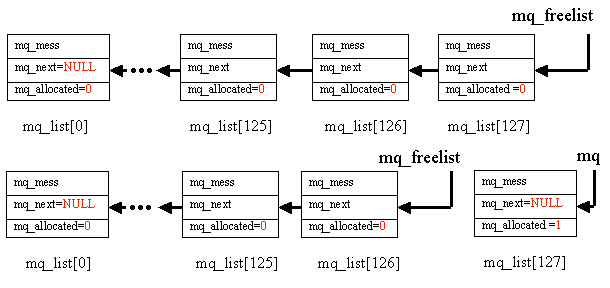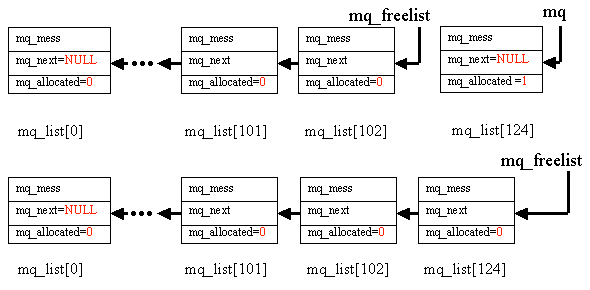0011001 /*0011002 inet/mq.c0011003 0011004 Created: Jan 3, 1992 by Philip Homburg0011005 0011006 Copyright 1995 Philip Homburg0011007 */0011008 0011009 #include "inet.h"0011010 #include "mq.h"0011011 #include "generic/assert.h"0011012 0011013 THIS_FILE0011014 0011015 #define MQ_SIZE 1280011016 0011017 PRIVATE mq_t mq_list[MQ_SIZE];0011018 PRIVATE mq_t *mq_freelist;0011019 0011020 void mq_init()mq_init()
mq_init() initializes mq_list[] and mq_freelist as follows:

Click here for a detailed description of mq_list[] and mq_freelist.mq_init()
mq_init() initializes mq_list[] and mq_freelist as follows:

Click here for a detailed description of mq_list[] and mq_freelist.mq_init()
mq_init() initializes mq_list[] and mq_freelist as follows:

Click here for a detailed description of mq_list[] and mq_freelist.
Participant comment / Author: Andy Swartzbaugh / Date of Posting: 2005-08-29
This is a test comment.
Participant comment / Author: / Date of Posting: 2005-08-29
This is ' another test comment.
Participant comment / Author: Andy 2 / Date of Posting: 2005-08-29
This is " another test comment.
mq_init() initializes mq_list[] and mq_freelist as follows:

Click here for a detailed description of mq_list[] and mq_freelist.mq_init()
mq_init() initializes mq_list[] and mq_freelist as follows:

Click here for a detailed description of mq_list[] and mq_freelist.mq_init()
mq_init() initializes mq_list[] and mq_freelist as follows:

Click here for a detailed description of mq_list[] and mq_freelist.
Participant comment / Author: Andy Swartzbaugh / Date of Posting: 2005-08-29
This is a test comment.
Participant comment / Author: / Date of Posting: 2005-08-29
This is ' another test comment.
Participant comment / Author: Andy 2 / Date of Posting: 2005-08-29
This is " another test comment.
0011021 {0011022 int i;0011023 0011024 mq_freelist= NULL;0011025 for (i= 0; i<MQ_SIZE; i++)0011026 {0011027 mq_list[i].mq_next= mq_freelist;0011028 mq_freelist= &mq_list[i];0011029 mq_list[i].mq_allocated= 0;0011030 }0011031 }0011032 0011033 mq_t *mq_get()mq_get()
mq_get() returns a pointer to the next available element of mq_list[] on mq_freelist.

Click here for a detailed description of mq_list[] and mq_freelist.
mq_get() returns a pointer to the next available element of mq_list[] on mq_freelist.

Click here for a detailed description of mq_list[] and mq_freelist.
0011034 {0011035 mq_t *mq;0011036 0011037 mq= mq_freelist;0011038 assert(mq != NULL);0011039 0011040 mq_freelist= mq->mq_next;0011041 mq->mq_next= NULL;0011042 assert(mq->mq_allocated == 0);0011043 mq->mq_allocated= 1;0011044 return mq;0011045 }0011046 0011047 void mq_free(mq)0011048 mq_t *mq;mq_free()
mq_free(mq) places mq, mq_free()'s only parameter, back on mq_freelist.

Click here for a detailed description of mq_list[] and mq_freelist.
mq_free(mq) places mq, mq_free()'s only parameter, back on mq_freelist.

Click here for a detailed description of mq_list[] and mq_freelist.
0011049 {0011050 mq->mq_next= mq_freelist;0011051 mq_freelist= mq;0011052 assert(mq->mq_allocated == 1);0011053 mq->mq_allocated= 0;0011054 }0011055 0011056 /*0011057 * $PchId: mq.c,v 1.6 1996/05/07 21:10:16 philip Exp $0011058 */


Messages that the network service receives from the other services (file system, memory manager, etc.) and the kernel are placed into a linked list. This linked list is formed with the following struct:
and is initialized by mq_init(). After initialization, the linked list is as follows:
As messages are received, mq_get() is called to acquire the element of mq_list[] pointed to by mq_freelist. This element holds the message until the message is processed. mq_allocated for this element is set to 1 and mq_freelist is advanced to point to the next element.
After the message is processed, mq_free() places the element back onto mq_freelist and sets mq_allocated back to 0.
As with other queues within the network service, the memory for the message queue comes from an array with a limited number of elements. This must be done because memory within Minix is scarce (for one reason, Minix does not have virtual memory).
Click here for a description of the different types of messages.